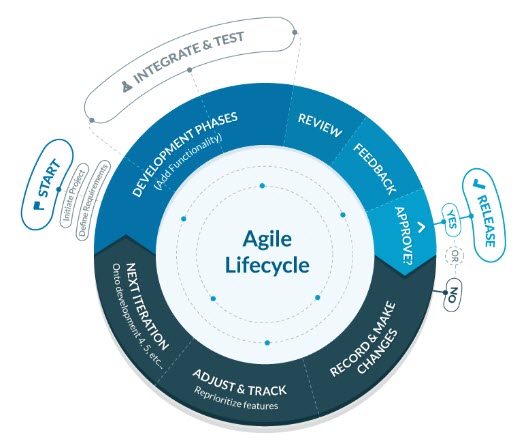Software development for startups is by no means a one-size-fits-all process. It requires consistent trial and error, an organizational temperament that prioritizes adaptability, and an almost unrelenting dynamism in approach to both project management and technical elements. As a result, a Startup’s Guide to Finding a Software Development Company should be one that focuses on the complexities of how to approach the process, rather than a recipe book that claims to guide you through some imagined universally applicable instruction set to app making. Believe us, cookie cutters are not the right tools for this industry.
You may be at the point on your software development journey where you are sitting on a golden ticket of an idea and wondering how to actualize it. Perhaps you are a non-technical founder of a startup who has everything in place, except that one crucial component—a technical partner who can advise you on all things technology. It is at this point that you have to seek tech wisdom outside of your current sphere of knowledge if you want your concept/idea to see the light of profitability.
When it comes to software development for startups, the ratio of success stories for new apps is sobering. We’re not being hyperbolic. As little as 0.01% of new apps are considered financially successful by their founders. If you want to work toward launching software that ultimately gives you significant ROI, your job is to define your philosophical and practical approach as soon as possible so you do not have to kick yourself down the line for adopting cumbersome working methodologies that either slow you down or don’t add any value.
So without further ado, we bring you Sygma Technology’s very own guide to software and technology development for start-ups.
** Download This Full Guide Here**
Take the guide with you! Just fill out the form on the right and get your free .pdf copy.

At the forefront of any entrepreneur’s mind is the question of how much you have to pour into the development of your product or service before you get something out. Particularly if you have not secured software funding for your concept, taking on the risk of materializing a new idea can be daunting.
We wish we could give you a concrete number and say that launching software costs y + z = $x (get out your calculators). Unfortunately, the reality is a little more complex than a single number would be able to portray. So many factors go into software development that any universally applicable figure would be a misnomer and completely inaccurate.
What we can do, however, is give you an idea of the key elements to consider when constructing a cost breakdown for software development for startups. You can then take the ball and run with it.
Some factors to consider are:
You cannot speak of contemporary approaches to software development without mention of the word Agile. We discuss this in more detail in our post Keeping Outsourced Developers on Track, but in brief, this approach to software development for startups is one that’s iterative, prizes consistent testing and responsivity, and works towards the best possible software with the resources available.
Agile Development centers meaningful interaction between client and developer and is as much an approach to project management as it is to technological development.
In the below image from Capterra, the process of launching software is outlined clearly and delineates the agility inherent in the model:

Agile Development typically embraces (Continuous Integration / Continuous Deployment) CI/CD Methodology, which is based on having centralized information repositories and standardized processes as well as short feedback loops between client and developer. Having to repeat tasks or perform them manually is the enemy of efficient software development for startups. The more you can avoid this, the more streamlined your process will be.
Add to this a robust, automated testing framework and you are well on your way to having an intelligent approach to software development for startups.
Embracing prototyping and MVP Development can form a vital part of your development process. By creating simplified versions of your final product, you will quickly learn what works and what doesn’t, and you will also have something to show when looking for software funding.
Next question? Like children in the backseat of a car on a long road trip, you may want to know, “How long till we get there?”
The short answer? Launching software takes in the region of 18 weeks. In our post How Long Does it Take to Build an App, we take you through the 4 D’s of Development and what you can expect from each phase.
It’s important to note that this is really a “how long is a piece of string” kind of question. Software development for startups is by no means an exact science. One has to factor in the other D’s: Delay and Disappointment. In fact, your team’s ability to troubleshoot problems and adapt is at the heart of your success when it comes to launching software.
Now, where are you going to find the individual or agency that will help you bring your project to fruition?
If you are new to the tech world, knowing where to start looking for an app developer or development agency may seem like the biggest obstacle to launching software. It doesn’t have to be.
There are a variety of online resources available that can guide you in the right direction, and of course, there’s the age-old truth that nothing quite beats word of mouth. A referral from a trusted source in the know is ultimately indispensable. Also, check out our post 3 Ways to Find an App Developer.
There is also an increasing trend toward outsourcing software development overseas. When you look at the immediate costs, this indeed appears to be an attractive option. Due to lower costs of living and salary expectations, overseas developers can typically charge significantly less than their local counterparts.
While this option may look enticing, it’s important to note that this will not always land you in a more advantageous position down the line. There are various pitfalls to outsourcing software development for startups that must be taken into consideration before you take a plunge that you might regret.
Have a look at this list of the most important questions to ask when hiring an app developer. You want to feel comfortable that you had the appropriate information to make the right decision.
By providing you with this startup’s guide to software and technology development, we want to do our part in making sure that your approach to launching software is one where you feel armed with the right knowledge and expertise to enter this world from an informed basis.
We didn’t arrive at the position where we can be an authority on software development for startups by accident. We’ve played with the big names in the Fortune 100. Sygma Technology’s years of experience in enterprise-level software development has taken us down avenues where we have confronted both problems to be solved and successes to be measured. In doing so, we have refined our own methodologies, enforcing our position as an ideal tech partner for startups wishing to see their ideas bloom.
If you would like to discuss any of these points further or see how we might be able to partner up to help your vision see the light of day, give us a shout. Nothing invigorates us more than seeing our clients’ concepts come to fruition. Talk soon.
Meet with a Sygma Technology software consultant. The goal of this call is to provide the following:
Say hello to the extension of your development team.